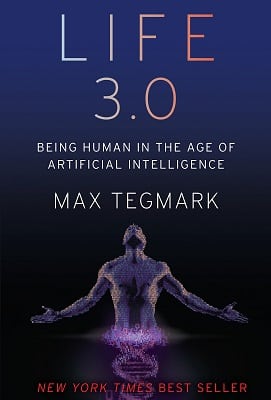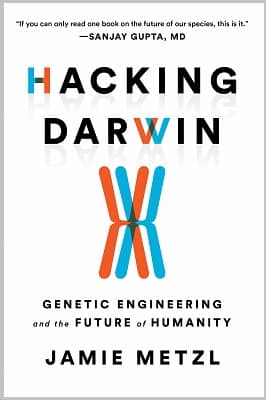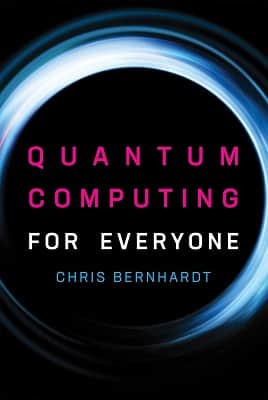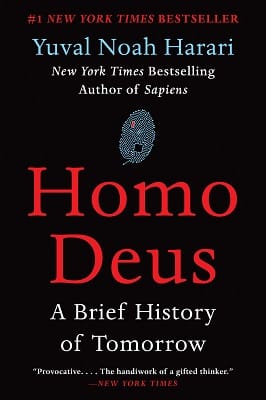
Feature
Near-Future Books
Felix Holzapfel
I side with those who believe the digital age has just begun, and that in our thinking about technology, the world is still flat. We are moving towards fundamental tipping points. Artificial intelligence (AI), quantum computing, biotechnology, genetic engineering, nanotechnology, and robotics converge in many different ways.
A small step forward in one field may lead to a breakthrough in another. Things could suddenly move with lightning speed
Nobody knows how long it will take—a couple of years? a couple of decades?—until we reach some critical tipping points that will kick off an exponential growth in terms of technology and progress. Many leading experts agree on strong indicators that technologies will fundamentally change our future sooner rather than later. In this article, I will introduce you to some of my favorite near-future tech books that illustrate the status quo and discuss potential uses and future scenarios of the most critical technologies.
Frankly, I love exploring other people’s favorite books list, but I don’t like creating my own. I always feel like I’m missing something and being unfair to all those books that inspired me and didn’t make my list. Thus, please forgive me if I haven’t listed your book. So without claiming the list is exhaustive, here we go with a selection of my favorite near-future tech books:
Tegmark, M. (2018). Life 3.0: Being human in the age of artificial intelligence. Vintage.
Of course, numerous books about artificial intelligence (AI) discuss its strengths, weaknesses, opportunities, and threats. My favorite in this category is still Life 3.0: Being Human in the Age of Artificial Intelligence. Max Tegmark, MIT professor and co-founder of the Future of Life Institute, combines his deep technological understanding with his theoretical knowledge and practical insights across multiple disciplines in a highly entertaining way. The book begins with a short fictional story about a company inventing the first superintelligent AI, which disrupts several markets before turning the political landscape upside down and ruling the world.
This brief introduction only sets the stage for plenty of scenarios and ideas based on the status quo of science and technology. After explaining Life 1.0: our biological origins and Life 2.0: cultural development in humanity, Tegmark introduces Life 3.0: the technological age of humans. One of the main topics of Life 3.0 is if, when, and how we’ll achieve the status of Artificial General Intelligence, meaning algorithms that can understand, learn, and solve any intellectual task a human can. Tegmark, like me, is among those people who believe our achieving Artificial General Intelligence is only a matter of time and is most likely to happen sooner rather than later. What does our having an explosion of new know-how and capabilities in artificial intelligence mean? How will increased artificial intelligence impact our economy, society, and species? Tegmark describes short- and mid-term implications and long-term scenarios for how our future could look. I like the book because it paints worst-case scenarios yet spreads hope by illustrating how we can maximize our chances of a positive outcome of the AI revolution.
Metzl, J. (2019). Hacking Darwin: Genetic engineering and the future of humanity. Sourcebooks.
I became aware of Jamie Metzl’s Hacking Darwin by listening to Eric Weinstein’s podcast The Portal. I ordered the book directly after listening to the episode “The Bio-Hacker Will See You Now, Ready 0r Not.” During the Introduction, Jamie Metzl, a technology futurist and geopolitical expert, writes that when our descendants two hundred years from now look back at our present age, they will say managing and manipulating our genetic makeup was the greatest challenge of our time. Due to his geopolitical background, Metzl puts this statement in the context of foreign policy. I would go one step further and say managing and manipulating our genetic makeup is the most significant or at least one of our species’ greatest challenges overall.
While writing articles in policy journals and giving speeches on the future of human genetic engineering, Metzl became increasingly convinced that we as a society haven’t been doing nearly enough for the coming genetic revolution. (I believe this is true up to the present.) Metzl decided that the best way to get his message across was using the language and storytelling of a novel to explain the real science of the genetic revolution. The result was Hacking Darwin.
I was working on a similar tech fiction while listening to Eric Weinstein’s podcast. Funnily, biotechnology was part of my project as well. Thus, Metzl’s message fell on fertile ground, and I immediately soaked up his book like the proverbial sponge. It’s a thought-provoking overview of the status quo and possible future scenarios in the fields of biotechnology and genetic engineering. I have had a deep interest if not a scientific background in biotechnology for a couple of years now. I found plenty of helpful references to research of which I wasn’t yet aware. I also liked the book because it doesn’t leave you alone with your thoughts after reading. Metzl included a Political Engagement Guide that offers a few simple steps and questions to motivate readers take action. Bottom line: I strongly recommend this book to anyone who wants to learn more about the genetic revolution.
Advertisement
Bernhardt, C. (2020). Quantum computing for everyone. MIT Press.
Quantum Computing for Everyone is probably the nerdiest but also the most important book on my list. Why? AI, biotech, genetic engineering, and robotics are already on many people’s radar. Unfortunately, the same can’t be said for quantum computing. Even more critical is that quantum computing may be the most crucial element in the mix of converging technologies. Quantum computers could perform complex calculations within seconds that take thousands of years with the fastest supercomputer available today. This breakthrough could bring order into the chaos that prevents us from taking the next big step in AI or biotech. We could create more complex algorithms or handle vast amounts of data beyond our current possibilities and even beyond our imagination. Most likely, this situation would lead to a Big Bang of innovation across multiple disciplines. Chris Bernhardt, a professor of mathematics at Fairfield University, explains the fundamentals of quantum computing in an intriguing and easy-to-understand way—at least, to the extent that one can speak of easy-to-understand when talking about topics like quantum bits, superposition, quantum entanglement, quantum teleportation, quantum gates, and quantum algorithms. Don’t worry; you don’t need to be a mathematical genius to understand the book, but knowing algebra basics on a high school level is helpful. Once you get past some theoretical obstacles, Bernhardt will unfold the exciting basics and possibilities of quantum computing directly in front of you.
Harari, Y. N. (2016). Homo Deus: A brief history of tomorrow. Random House.
Now that I have introduced you to three books that focus on single disciplines in the field of converging technologies, I want to end with a book that connects the dots across multiple disciplines because this is where the action is. The status quo, breakthroughs, and ideas in each single domain are already breathtaking. But there’s a reason we are talking about converging technologies. We need to connect the dots across several disciplines to see the big picture and realize the full scope of what’s about to come. Home Deus handles this challenge compellingly. Thus, Homo Deus: A Brief History of Tomorrow is my favorite book of all the bestsellers about the past and future of humanity by Yuval Noah Harari, a history department professor at the Hebrew University of Jerusalem.
One of the keys to Harari’s success is his ability to discuss demanding topics in an easy-to-understand and entertaining way. He also knows how to put ideas into the proper context to paint a clear bigger picture. In Homo Deus, Harari first summarizes where humanity comes from and how we climbed to the top of the food chain to become the species and society we are today. He explains how intersubjective realities, e.g., countries, borders, money, or religion that only exist in human minds enabled us to collaborate in large groups and give meaning to our achievements.
Harari takes us on a journey about how modern technologies like artificial intelligence, big data, and biotechnology could transform our idea of humanism to transhumanism. We know that life is based on biochemical algorithms. Currently, we are not able to understand these algorithms. But once we can, technological and biochemical algorithms could merge and open the gate to one of humanity’s ultimate targets—immortality. That’s what Harari calls Dataism.
Harari reports most scientists believe we are “far apart” from artificial intelligence reaching the level of human intelligence or giving birth to genetically engineered babies. He explains that terms like “far apart” often mean up to only twenty years, and “never” usually means not more than fifty years. When Harari wrote Homo Deus in 2016, leading scientists proclaimed that it would still take “a long time” until the birth of the first genetically engineered baby. The reality was much faster than the wildest predictions of leading scientists. Rather than decades, it took only two years until Chinese scientist He Jiankui announced he had manipulated the genome of twins Lulu and Nana who were born in 2018.
Although Homo Deus was published more than five years ago, which means a lot when talking about technology, for me, it is still one of the best books offering a generalist overview and some thought-provoking ideas.
advertisement
Bottom line:
Plenty of great near-future tech books are out there. They introduce exciting disciplines and vividly illustrate the status quo, which may already feel like science fiction—especially to readers whose daily business is not being up-to-date with the latest science and technology trends. The books outline potential uses in fields like AI, biotech, and quantum computing.
All authors somehow have the same message:
We are well-advised to encourage everyone to learn about converging technologies and how they will transform our society, our way of life, and perhaps even our species. The tools required to take our world and species to the next level are already at our fingertips. But it’s up to each of us to ask and answer some critical questions, to make sure we are heading in the right direction, and to prepare as well as possible for the most significant transformation in our species history.
About the Author
Thinkers 360 recognized Felix Holzapfel as a Top 10 Global Thought Leader in Digital Transformation. During the last two decades, Holzapfel has been privileged to support many global players on their way to the digital age. While he has published several books about technology, trends, and the shift in our media landscape, Catch-42 is his first novel and a book he has wanted to write for a long time. Having sold his digital marketing agency to one of the world’s leading IT services providers, he now has time for this passion project.
To learn more, visit www.catch-42.com or www.felixholzapfel.com.
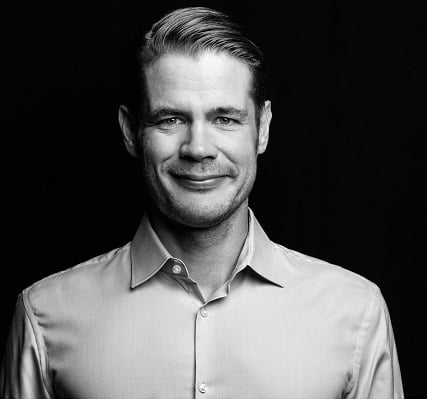
Similar Features
Space Opera Thrillers
Nail-biting tension in worlds of spaceships and doom
Artificial Intelligence in Thrillers
AI and Identity in Thrillers
Sci-fi Mysteries
Why we love science fiction mysteries
Advertisement

